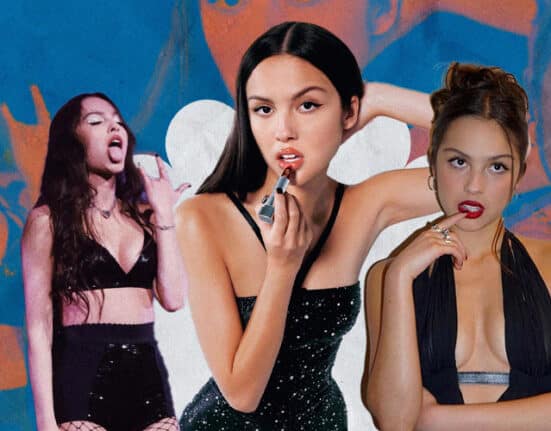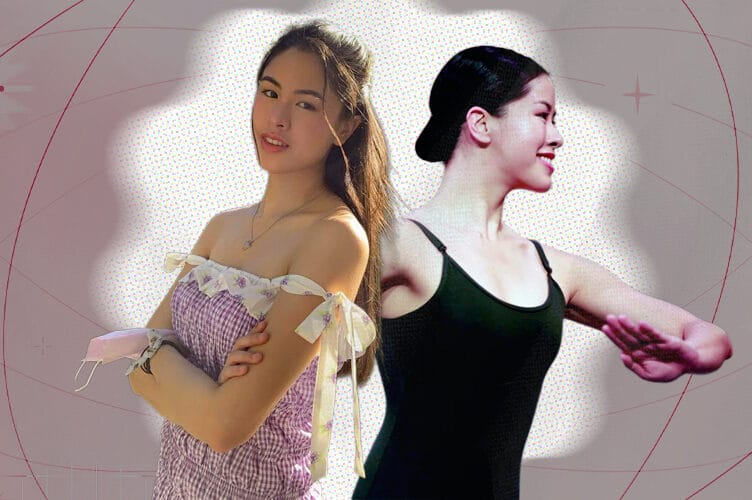ASK anyone to describe teenage girlhood, and they might conjure images of pink clothes, glittering sparkles, and doodles of stars and hearts.
Media often gravitates toward portraying girlhood in this light, drawn to its potential for visually appealing, eye-candy imagery that easily captures attention.
But while this depiction is not entirely false, it represents only a small fraction of what it actually feels like to be a teenage girl. It rarely shows the social difficulties and pressures that come with a girl’s coming-of-age, shaping her experiences that go beyond glitter and pink.
For others, teenage girlhood is Regina George in pink clothing. On the surface, it might seem sweet and endearing, but beneath the niceties lies a certain brutality, carefully masked by the glossy exterior.
Some media were lauded for their exploration of this other side, shedding light on the social, psychological, and emotional challenges that are often ignored in exchange of a more acceptable and pleasant portrayal.
Films like The Virgin Suicides (1999), Mean Girls (2004), Lady Bird (2017), and Do Revenge (2022) excel not only in capturing the humor that comes with growing up, but also in portraying the complexity it contains— nuances that are often overlooked or mishandled by male filmmakers.
However, girlhood is a topic explored not only in cinema and visual arts, but also in music. Taylor Swift’s earlier albums delved into the narratives that resonate with the teenage girl’s experiences, earning her a huge fanbase among them.
In the current era of pop music, the narrative of teenage experiences remains a central theme. We see it in the works of the younger generation artists like Sabrina Carpenter, Billie Eilish, and Conan Gray.
Among them is Olivia Rodrigo, an American singer-songwriter who found her foothold as a Disney actress.
Many of Olivia’s songs from her two released albums Sour (2021) and Guts (2023) illustrate the raw emotions and struggles of adolescence into music.
From the insecurities caused by self-comparisons, the pressure that comes with being young, to the vicious gender politics, Olivia Rodrigo’s songs detail the brutal aspect of girlhood.
Jealousy, Jealousy, and Insecurity
Girlhood is brutal, but add social media to the mix, and you enter a whole new level of pressure, where comparison is magnified and self-worth becomes a currency, bought and measured by the quantity of likes, comments, and followers.
This is the environment that gave birth to several of Olivia’s bop songs such as jealousy, jealousy, brutal, obsessed and lacy.
In jealousy, jealousy, Olivia sings about how social media makes her extremely insecure about herself:
“And I see everyone getting all the things I want / And I’m happy for them, but then again, I’m not / Just cool vintage clothes and vacation photos / I can’t stand it, oh, God, I sound crazy.”
The envy Olivia feels clashes with the values she strives to uphold, reflecting the contradiction within Gen Z’s ‘positive and inclusive image’ and the reality of fake lifestyles and endless comparisons perpetuated by the internet:
“Their win is not my loss / I know it’s true / But I can’t help getting caught up in it all.”
This lingering insecurity not only leads Olivia to stray from the values she tries to uphold but also makes her question the very foundation of her self-worth: is it defined by her achievements, her relationships, or how others perceive her? In brutal, she sings:
“I’m so insecure, I think / That I’ll die before I drink / And I’m so caught up in the news / Of who likes me, and who hates you/ And I’m so tired that I might / Quit my job, start a new life / And they’d all be so disappointed / ‘Cause, who am I, if not exploited?”
This verse, in particular, highlights how the “Gaze”—other people’s perceptions of Olivia—shapes and manipulates her self-image. The line, ‘Cause who am I if not exploited, mirrors a harsh reality for many girls, who are often taught at a very young age that their worth is tied to how much they can offer or what others can take from them.
Vampire and the cost of being young
Girlhood is often idealized, especially in a patriarchal society that tends to view young girls as abstract concepts rather than real, complex human beings.
They become the focus of idealized expectations and disturbing fantasies. Their transition to womanhood is depicted as an idealized duality, caught in the limbo between two worlds: they remain in the cradle of innocence, yet their maturing bodies quickly become the object of sexual desire under the male gaze.
Young enough to be preyed upon, and old enough to be sexualized.
This is what Olivia Rodrigo explores in her song vampire. At first glance, vampire might seem like just another generic breakup song. However, when you consider the context behind its creation, it becomes clear that Olivia was not simply grappling with a heartbreak, but with the exploitation of her girlhood by an older man.
She referenced it directly in the song:
“Went for me, and not her / ‘Cause girls your age know better.”
In this line, Olivia demonstrates that her naivete as a young girl was exploited by this older lover, whose tricks won’t probably work with someone who finally reached womanhood and had enough experience.
This is a constant theme in girlhood that we can also see in fairytales. For example, several analyses of The Red Riding Hood claim that it’s a cautionary tale for young girls about the predatory nature of older men. The wolf— a predatory beast— was used in the story to serve as the metaphor for dangers posed by those who prey on innocence.
In Olivia’s song, the predator took another form— he’s a vampire:
“Bloodsucker, famefucker / Bleedin’ me dry, like a goddamn vampire.”
We can interpret Olivia’s vampire take in many different ways. But putting it in the context of the guy who manipulated Olivia and used her innocence against her, we can say that it’s a symbol of the emotional drainage and exploitation that she went through in his hands.
Vampires are known to feed on the blood of their victims. In the song, when Olivia says that he’s a bloodsucker, it doesn’t literally mean that he fed off her blood, but rather her feelings— draining her emotionally and leaving her hollow while continuing to demand for more.
It can also be viewed as a representation of his predatory nature, since the folklores often portray vampires as predators. They are charismatic and manipulative, victimizing impressionable young girls.
What’s even worse is that when young girls become victims due to their lack of experience with such situations, the blame often still falls on them. Little Red Riding Hood was written as a cautionary tale for girls—but where are the stories that warn boys about being predators? Why are we so focused on telling young girls to be careful, instead of teaching boys not to commit such acts?
The self-blame Olivia felt also became apparent in the song. In the chorus, she sang with a wailing vulnerability, blaming herself for not being smart enough to recognize the signs of manipulation:
“’Cause I’ve made some real big mistakes / But you make the worst one look fine / I should’ve known it was strange / You only come out at night / I used to think I was smart / But you made me look so naive / The way you sold me for parts / As you sunk your teeth into me…”
Her voice builds up in an agonized crescendo as she finally lets out her anger, calling out her older lover for who he really is— a bloodsucking vampire.
All-american ‘boxed-in’ expectations
Speaking of ideals, one of the most frustrating aspects of girlhood—and even womanhood—is society’s rigid gendered expectations. A big part of this is the pressure to perform certain roles, as if identity is something to be acted out rather than lived authentically.
In her song, all-american bitch, Olivia Rodrigo mocked this norm. As a woman coming from the heritage of persons-of-color, Olivia bared her struggles to fit in the idealized American culture.
She did it so with unmistakable humor, using a sarcastic undertone that winks at you because of an inside joke exclusive only to women’s lived experiences:
“I am light as a feather / I’m as stiff as a board / I pay attention to things that most people ignore / And I’m alright with the movies that make jokes ’bout senseless cruelty / That’s for sure.”
This line, for example, showcases Olivia’s sarcasm. She began the song with images often associated with women, like being ‘light as a feather’ and ‘paying attention’ to trivial things.
But in the same sweet tone, she threw a darker image, almost with a studied nonchalance, about ‘senseless cruelty’ in the movies. She seems to imply that Americans are so keen into maintaining the rigid gender structure, but are so lenient when it comes to more important matters like the prevalence of violence.
It is also worth noting the difference in how Olivia approaches the first verse compared to the chorus. She started in a sweet tone, subtle in her mockery. Yet the chorus was an explosion, a chaotic and fun riff of an electric guitar:
“Forgive and I forget / I know my age and I act like it / Got what you can’t resist / I’m a perfect all-American bitch / With perfect all-American lips / And perfect all-American hips / I know my place, I know my place, and this is it,” shouts Olivia.
It is, as we said before, splashed in sarcasm. The only difference is that Olivia doesn’t try to hide her incredulity at the ridiculousness of the ideals expected from her.
This is how it is to be a girl or a woman. You are boxed in standards that are impossible to achieve. You are expected to remain thin and beautiful, while at the same time, you must not flaunt that beauty. You must be knowledgeable enough to make small talk, but not too smart that you outshine men. You must be innocent, but not a bore. Sexy but not liberated.
Girlhood means dealing with a series of contradicted expectations, no matter how absurd that sounds.
Girlhood dimensions
For all the stereotypes and pressures, Olivia Rodrigo’s work reminds us that girlhood is not one-dimensional. It is complicated, messy, and multifaceted, and it is high time we listen to girls and young women who are unafraid to articulate their struggles and desires.
No— girls are not just the stereotypical queenbees or nerds you see on your television. They are not just a damsel in distress waiting for their knight in shining armor, or that lovestruck high school girl who could make the jocks fall in love once she removes her glasses.
Girls are more than just stereotypes—they are complex human beings capable of experiencing a wide range of emotions. And girlhood is more than glitter and pink clothes; it is a challenging journey shaped by gendered expectations and predatory behaviors that often complicate their path to self-discovery.
If a man tells you that being a girl is easy, just quote Cecilia from The Virgin Suicides (1999):
“Obviously, Doctor,” she said, “you’ve never been a thirteen-year-old girl.”
How useful was this post?
Click on a star to rate it!
Average rating 0 / 5. Vote count: 0
No votes so far! Be the first to rate this post.
We are sorry that this post was not useful for you!
Let us improve this post!
Tell us how we can improve this post?








